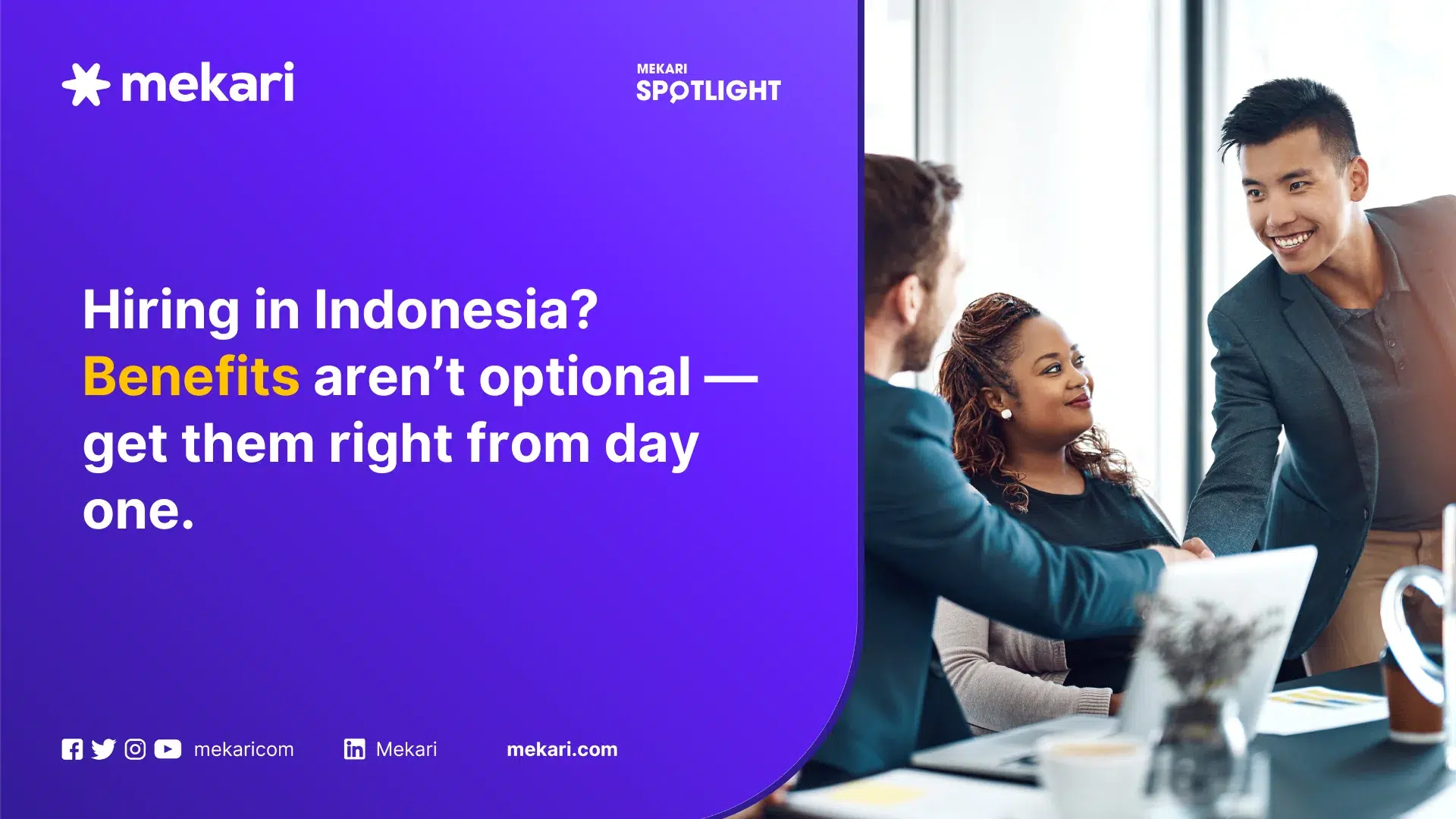Mekari Insight
- To stay compliant with Indonesian labor law, companies must provide key benefits such as BPJS (health and employment security), holiday bonuses (THR), overtime pay, paid leave, and region-based minimum wages.
- While not mandatory, supplemental benefits like private insurance, flexible work, wellness programs, and development support help attract top talent and boost employee retention in Indonesia’s competitive job market.
- Mekari Talenta simplifies HR operations, while Mekari Flex empowers employees with customizable, on-demand benefits. Mekari helps businesses manage compliance, improve satisfaction, and offer benefits that truly make a difference.
With over 260 million people, Indonesia is one of the fastest-growing economies globally, offering both specialist and non-specialist job opportunities.
For foreign companies, understanding compensation and employee benefits in Indonesia is crucial to attract and retain top talent.
This article will guide you through the essentials of designing a competitive benefits and compensation package in Indonesia.
Mandatory employee benefits in Indonesia
By understanding and adhering to these mandatory benefits, foreign companies can navigate Indonesia’s complex labor laws and provide their employees with essential protections and compensation.
1. Social Security Programs (BPJS)
Indonesia’s social security system, BPJS (Badan Penyelenggara Jaminan Sosial), consists of two key components: BPJS Kesehatan (Health Insurance) and BPJS Ketenagakerjaan (Employment Social Security). Both programs are essential for providing protection against health and work-related risks.
BPJS Kesehatan (Health Insurance)
BPJS Kesehatan offers affordable healthcare services for employees and their dependents, covering:
- Outpatient and inpatient treatment, surgeries, medications, and maternity care
- Emergency medical services and preventive care (vaccinations, screenings)
Contributions:
- Employee: 1% of monthly salary (with a salary cap of IDR 12 million per month in 2025)
- Employer: 4% of monthly salary
- Total: 5% (1% from the employee, 4% from the employer)
Eligibility: All employees in Indonesia, including expatriates with contracts longer than six months, are eligible. Coverage extends to the employee’s spouse and up to three children under 21 years old.
BPJS Ketenagakerjaan (Employment Social Security)
BPJS Ketenagakerjaan provides protection for employees against risks like work accidents, old age, death, and job loss. It is mandatory for all employees, including expatriates.
It covers five main benefits:
| Benefit | Description | Employer Contribution | Employee Contribution | Government Contribution |
|---|---|---|---|---|
| Work Accident Insurance (JKK) | Covers medical treatment, rehabilitation, disability compensation, and death benefits due to work-related accidents. | 0.24%–1.74% (based on job risk) | 0% | N/A |
| Death Insurance (JKM) | Provides financial support to the family of an employee who passes away, regardless of cause. | 0.3% | 0% | N/A |
| Old Age Savings (JHT) | A savings plan for employees to access at retirement, resignation, or under certain circumstances like permanent disability. | 3.7% | 2% | N/A |
| Pension Insurance (JP) | Provides a pension income after retirement. | 2% | 1% | N/A |
| Job Loss Insurance (JKP) | Offers compensation and job support for employees who lose their jobs involuntarily. | 0.14% | 0% | 0.22% |
2. Religious Holiday Allowance (THR – Tunjangan Hari Raya)
The THR (Tunjangan Hari Raya) is a mandatory benefit in Indonesia that provides employees with an annual bonus before major religious holidays, such as Eid and Christmas. Here’s a deeper look:
- Eligibility: Employees must have worked for at least 12 months to receive one full month’s salary as THR. Those with less than 12 months of service are entitled to a prorated bonus.
- Purpose: The THR aims to help employees cover holiday expenses and is often used to buy gifts or make travel arrangements for their families during religious holidays.
3. Overtime Pay
Employees who work beyond the standard 40 hours per week are entitled to overtime pay. The overtime pay structure is as follows:
- First Hour: 1.5 times the regular wage.
- Subsequent Hours: 2 times the regular wage for hours worked beyond the first.
4. Paid Leave (Annual, Maternity, Paternity)
Paid leave is an essential component of employee benefits in Indonesia:
- Annual Leave: Employees are entitled to at least 12 days of paid leave after completing one year of service. This leave is generally provided for rest and recreation.
- Maternity Leave: Female employees are entitled to 90 days of fully paid maternity leave, which includes 1.5 months before and 1.5 months after childbirth.
- Paternity Leave: Male employees are entitled to two days of paid leave for the birth of a child.
5. Minimum Wage Compliance
Indonesia sets a regional minimum wage, which varies across provinces and sectors. Employers must adhere to the minimum wage set by the local government, ensuring that employees receive fair compensation for their work.
Read more: Payroll, Contracts & Employment Laws in Indonesia 2025Supplemental and lifestyle benefits

While not legally required, these benefits can help attract top talent and improve employee satisfaction:
- Private health insurance: Offers additional coverage beyond BPJS, including access to private hospitals and quicker services.
- Meal allowances or catering: Provides daily meal stipends or in-house catering for convenience.
- Transportation allowance: Helps with commuting costs through stipends or shuttle services.
- Flexible work arrangements: Includes remote work, flexible hours, and compressed workweeks for better work-life balance.
- Wellness programs: Gym memberships, health screenings, and mental health support to promote well-being.
- Professional development: Training, tuition reimbursement, and leadership programs to support career growth.
- Financial wellness: Retirement savings plans and financial planning workshops to support long-term security.
- Social and recreational activities: Team outings, volunteering, and on-site recreation to strengthen employee engagement.
- Employee assistance programs: Counseling for mental health, legal, or personal issues.
These benefits can enhance your company’s appeal by fostering a supportive and engaging work environment.
Employee that entitled with benefits in Indonesia
In Indonesia, employees are entitled to various benefits if they meet certain criteria.
Types of employment eligible for benefits
- Full-time employees: Employees working under a formal contract (written or oral), meeting the minimum employment duration of three continuous months. These employees are entitled to the full range of statutory benefits.
- Part-time employees: Also covered by the same regulations as full-time employees, provided they meet the employment duration requirement of more than three months.
- Temporary employees: Temporary workers are entitled to benefits, including health insurance and leave, as long as they have worked for more than three continuous months.
- Apprentices and trainees: While not typically entitled to the same benefits as full-time employees, apprentices and trainees may receive limited benefits depending on their agreement with the employer.
- Freelancers or independent contractors: These workers are generally not eligible for statutory benefits, as they are not considered employees under Indonesian law. However, employers may choose to offer supplemental benefits to these workers to remain competitive and supportive.
Employee benefits are governed by Law No. 13 of 2003 on Employment in Indonesia.
This law stipulates that employees who have worked for an employer for more than three continuous months are entitled to statutory benefits, including social security, health insurance, paid leave, and other related entitlements.
Read more: How Staff Augmentation in Indonesia Helps Businesses GrowHow to manage employee benefits efficiently
Efficient management of employee benefits is essential for maintaining a satisfied workforce and ensuring business compliance. Utilizing the right tools can simplify administrative tasks, ensure regulatory adherence, and improve decision-making processes.
For comprehensive HR management, Mekari Talenta stands out as the top SaaS solution. It offers complete HR management tools for both business and employee needs, including centralized data management, employee self-service, and strategic HR tools powered by the latest technology.
For flexible benefits, Mekari Flex is the ideal solution. It provides employees with options like Earned Wage Access to meet unexpected needs, Flex Installment for low-interest loans and installment plans, and Flex Benefit, a customizable program that lets employees choose benefits that suit their unique needs.
Explore more on how integrated SaaS from Mekari can help your company manage operations thoroughly.

